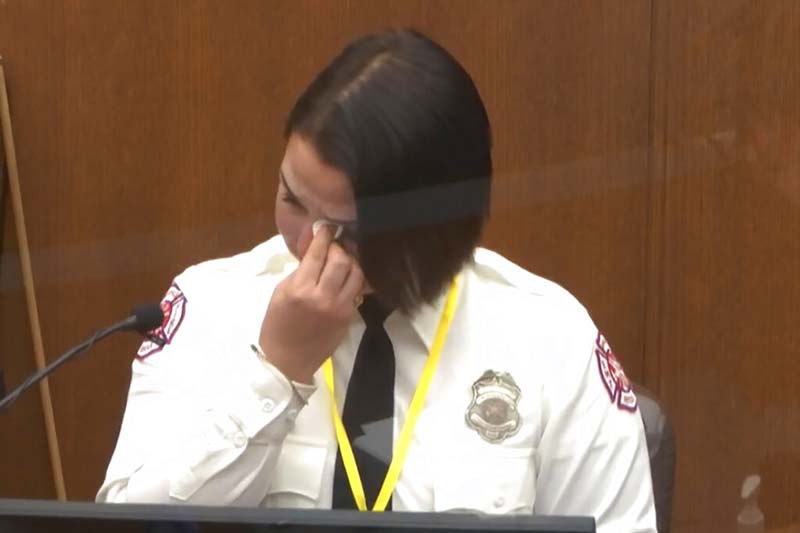

A Minneapolis firefighter who wept as she recalled being prevented from using her EMT training to help George Floyd will be back on the stand Wednesday in the trial of the fired police officer charged in Floyd’s death.
Genevieve Hansen, one of several bystanders seen and heard shouting at Derek Chauvin as he pinned Floyd facedown outside a convenience store last May, described her desperation Tuesday as she recounted how she was unable to come to Floyd’s aid or tell police what to do, such as administering chest compressions.
“There was a man being killed,” said Hansen, who testified in her dress uniform and detailed her emergency medical technician training. “I would have been able to provide medical attention to the best of my abilities. And this human was denied that right.”
Hansen was among several onlookers to testify Tuesday to what they saw of Floyd’s May 25 death. They described their increasing frustration, anger and despair as they begged Chauvin to take his knee off Floyd’s neck.
Witness after witness described how Chauvin was unmoved by their pleas, including the teenager who shot the harrowing video of the arrest that set off nationwide protests. She said the officer gave the crowd a “cold” and “heartless” stare.
“He didn’t care. It seemed as if he didn’t care what we were saying,” said 18-year-old Darnella Frazier, one of several witnesses who testified through tears.
Chauvin continued to kneel on Floyd while fellow Officer Tou Thao held the crowd of about 15 back, even when Hansen identified herself as a firefighter and pleaded repeatedly to check Floyd’s pulse, according to witnesses and bystander video.
“They definitely put their hands on the Mace, and we all pulled back,” Frazier told the jury.
Chauvin, 45, is charged with murder and manslaughter, accused of killing Floyd by pinning the 46-year-old handcuffed Black man to the pavement for what prosecutors said was 9 minutes, 29 seconds. Floyd was arrested after being accused of trying to pass a counterfeit $20 bill at the convenience store.
Floyd’s death, along with the bystander video of him pleading that he couldn’t breathe, triggered sometimes violent protests around the world and a reckoning over racism and police brutality across the U.S.
The most serious charge against Chauvin carries up to 40 years in prison.
The defense has argued that Chauvin did what his training told him to do and that Floyd’s death was not caused by the officer but by a combination of illegal drug use, heart disease, high blood pressure and the adrenaline flowing through his body.
On Tuesday, the prosecution asked multiple witnesses to describe their horror at what they saw, buttressing the testimony with multiple videos, some of which had never been seen before. Many described feeling helpless and guilty as Floyd gasped for air, pleaded for his life and finally fell limp and silent, his eyes rolling back in his head.
The testimony was apparently aimed at showing that Chauvin had multiple opportunities to think about what he was doing and change course.
But Chauvin attorney Eric Nelson sought to portray the onlookers as angry and agitated, in an apparent attempt to show that the crowd posed a potential threat to police that might have distracted them during their encounter with Floyd.
Hansen testified that the crowd was getting more upset and that the paramedics did a “load and go”— placing Floyd on a stretcher and quickly getting him away from the crowd so he could be treated elsewhere.
Earlier Tuesday, Donald Williams, one of the onlookers, testified that he called 911 after paramedics took Floyd away, “because I believed I witnessed a murder.” In a recording of the emergency call, Williams can be overheard yelling at the officers: “Y’all is murderers, bro!”
During cross-examination, Nelson pointed out that Williams seemed to grow increasingly angry at the police, calling Chauvin “tough guy,” “bum” and other names, then calling Chauvin expletives, which the defense lawyer repeated in court.
Williams, a professional mixed martial arts fighter, initially admitted he was getting angrier, but then backtracked and said he was controlled and professional, and was pleading for Floyd’s life but wasn’t being heard.
Williams said he was stepping on and off the curb, and at one point, Thao put his hand on Williams’ chest. Williams admitted that he told Thao he would beat the officers if Thao touched him again.
But witnesses also testified that no bystanders interfered with police.
When Frazier was asked by a prosecutor whether she saw violence anywhere on the scene, she replied: “Yes, from the cops. From Chauvin, and from officer Thao.”
Also Tuesday, prosecutors played cellphone video recorded by another bystander, 18-year-old Alyssa Funari, that showed onlookers shouting and screaming at Chauvin after Floyd stopped moving. The footage also showed Hansen, the Minneapolis firefighter, calmly walk up to Thao and offer to help. He ordered her to get back on the sidewalk.
“I felt like there wasn’t really anything I could do as a bystander,” a tearful Funari said, adding that she felt she was failing Floyd. “Technically I could’ve did something, but I couldn’t really do anything physically … because the highest power was there at the time,” she said, referring to the police.
Frazier testified that she looks at her father and other Black men in her life and thinks of “how that could have been one of them.”
“It’s been nights I stayed up, apologizing and apologizing to George Floyd for not doing more, and not physically interacting and not saving his life,” she said, adding of Chauvin: “But it’s like, it’s not what I should’ve done, it’s what he should’ve done.”